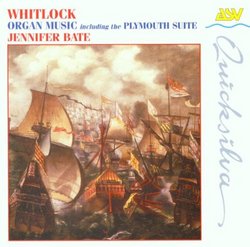| All Artists: Whitlock, Bate Title: Percy Whitlock: Organ Music Members Wishing: 0 Total Copies: 0 Label: Quicksilva Records Release Date: 11/16/1999 Genre: Classical Styles: Chamber Music, Forms & Genres, Suites, Historical Periods, Classical (c.1770-1830), Instruments, Keyboard Number of Discs: 1 SwapaCD Credits: 1 UPCs: 743625623321, 7436256233221, 743625623322 |
Search - Whitlock, Bate :: Percy Whitlock: Organ Music
 | Whitlock, Bate Percy Whitlock: Organ Music Genre: Classical
|
Larger Image |
CD Details |
CD ReviewsBeguiling music, authoritative performer, shame about the so R. J. Stove | Gardenvale, Victoria Australia | 06/03/2007 (2 out of 5 stars) "Percy Whitlock, who spent most of his short life (he died in 1946 when not yet 43) as an organist in various English provincial cities - and who during World War II became a civil servant - wrote nothing of consequence except miniatures for his own instrument; but in that genre he showed a kind of genius, and only the agonizing inferiority complex from which English music routinely suffers can account for his complete neglect elsewhere. (It is, unfortunately, characteristic of the NEW GROVE's 2001 edition that Whitlock is omitted altogether from that publication, although several dozen figures without a fiftieth of Whitlock's talent are reverentially included.)
The style of Whitlock combines, with improbable success, noble Elgarian melody and luxuriant Gershwinian harmony; "art deco" is as good a description as any of the result. A periodic hint of folksong also emerges, no doubt deriving ultimately from Whitlock's youthful studies with Vaughan Williams (both men shared a knack for cultivating folkish idioms without actually quoting folk themes). Occasionally Whitlock delivers joyful pastiche, as in the Scherzo from FIVE SHORT PIECES (1929), which is as gorgeous a neo-Handelian hornpipe as any Handelian could want. More often he achieves an original type of suave desolation, evident above all in the wonderfully plangent "Salix" - perhaps his greatest single utterance - from the PLYMOUTH SUITE (1937). This well-filled (71-minute) release, consisting of 1990s performances, should have been pure enjoyment: an entire Whitlock recital, in the hands of an artist whose Franck and Messiaen interpretations are among the most authoritative ever committed to disc, adorned with sensible booklet notes, and offered at a bargain price. Alas, it cannot be recommended even as a stopgap. Something has gone so hopelessly wrong with the recording quality that the outcome borders on the unlistenable. One must presumably blame the engineers rather than the (none too resonant) acoustics, because in both the venues employed - a Plymouth church for the PLYMOUTH SUITE, Swansea's Brangwyn Hall for everything else - the sound is impossibly distant. Detail after detail of these beguiling compositions can only be guessed at, unless you turn up the volume almost as far as the dial will go, in which case you hear almost as much motor noise as actual music. Even then the timbres wholly lack presence, except at the rather rare points where Jennifer Bate supplies generous quantities of two-foot and/or mixture-based tone. No amount of experience with tolerating prewar recordings' sonic deficiencies seems to be adequate preparation for this. At least the PLYMOUTH SUITE has turned up elsewhere (Donald Hunt's version released by Naxos, though itself hardly the ultimate hi-fi experience, is much more satisfying in aural terms). As for the rest, we must either seek out the Priory label's hard-to-find Compleat Whitlock on three expensive CDs, or wait till some other organist gives us a Whitlock miscellany that can be endured in some degree of comfort." |

 Track Listings (21) - Disc #1
Track Listings (21) - Disc #1